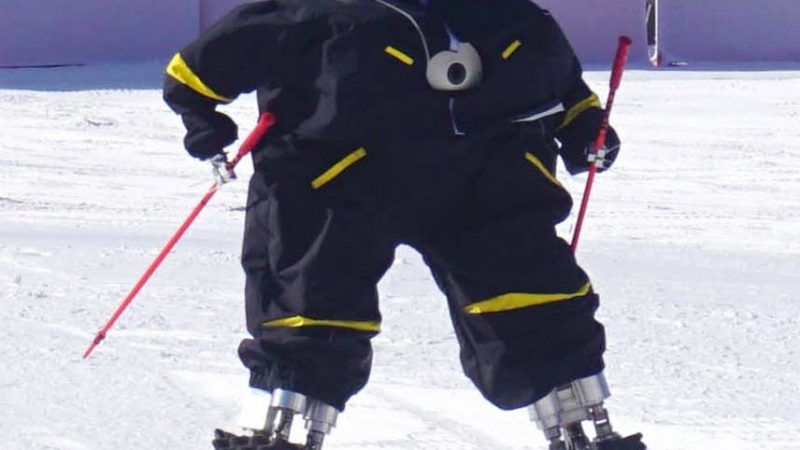Robots Are Skiing Now. Will They Take Winter Olympians' Jobs?
No, but they're awesome anyway.

Just down the road from where some of the best human skiers are competing—or, mostly, just waiting for the wind to stop blowing—at the Winter Olympics, eight of the world's most advanced skiing robots took to the slopes.
The results were decidedly mixed:
Adorable though it might be, that little guy probably isn't making Mikaela Shiffrin or Marcel Hirscher look over their shoulders at potential robotic competition. Still, the Robot Ski Challenge—hosted at South Korea's Welli Hilli ski resort, about an hour from the Olympic host city of PyeongChang—is impressive in its own right. Eight teams of robotics experts from universities and private institutions competed for a $100,000 top prize, The Daily Mail reports, with each robot equipped with camera sensors to detect the blue and red flags marking their course down the bunny hill.
Some competitors, like the one above, made a beeline for the flags. Others, though, were more successful at navigating the course—certainly more successful than I was the first time I put on a pair of skis. The Taekwon V, built by the Minirobot Corp., won the competition by successfully navigating the course in less than 18 seconds, according to CNET.
Are robots going to steal Olympic athletes' jobs? Not anytime soon. But the development of robo-skiers is another signal that athletics—like just about every other aspect of modern life—is going to be altered by the rapid advancement of high-level robotics. Some futurists, such as Britain's Ian Pearson, believe that a robotic soccer player capable of outplaying the best human footballers in the world could make its debut by the mid-2040s. If that's true, we might expect high-level robotic skiers much sooner, since skiing (and other Olympic sports, such as swimming and track) requires far less improvisation and mostly depends on the ability to follow a set course as quickly as possible.
Even if Robonia isn't competing at the Olympic Games, there's a good chance human athletes will be improved with the help of future robots. Canadian curling teams have used robots to analyze sweeping techniques to stay ahead of the technological curve—or rather, the curl. It's almost inevitable that high-level athletes in all sports will use robots to assist with training, and advanced biotechnology might help future Olympians go "higher, faster, stronger" (as long as prohibitionists don't get in the way).
Skiing robots have non-athletic applications too. They could be used for search-and-rescue operations in areas that are unsafe or inaccessible to human beings, particularly in the wake of natural disasters. Humans once bred Saint Bernard dogs for those difficult tasks, but it's not too difficult to picture a future where a robo-skier and one of those (admittedly sorta creepy) robotic dogs from Boston Dynamics are working together to save human lives.
Robots are going to disrupt many aspects of modern life, but the future isn't a zero-sum game and the development of advanced robots will enhance human life in ways we likely cannot imagine. "I can't tell you what people are going to do for work 100 years from now," MIT economist David Autor said in 2016, "but the future doesn't hinge on my imagination."
So laugh at the silly little skiing robots while you can. The future is coming, and the first full-fledged Robolympics are going to be awesome!


Show Comments (48)